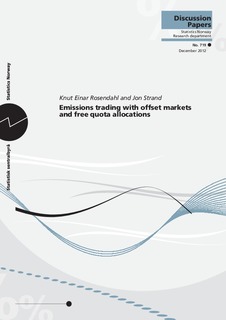Emissions trading with offset markets and free quota allocations
Working paper
Published version

Åpne
Permanent lenke
http://hdl.handle.net/11250/2628033Utgivelsesdato
2012-12Metadata
Vis full innførselSamlinger
- Discussion Papers [1003]
Sammendrag
We study interactions between a “policy bloc’s” emissions quota market and an offset market where emissions offsets can be purchased from a non-policy “fringe” of countries (such as for the CDM under the Kyoto Protocol). Policy-bloc firms are assumed to benefit from free quota allocations that are updated according to either past emissions or past outputs. We show that both overall abatement, and the allocation of given abatement between the policy bloc and the fringe, tend to be inefficient. When the policy-bloc quota market and offset markets are fully integrated (and firms buy offsets directly from the fringe), and all quotas and offsets must be traded at a single price, it is optimal for the policy bloc to either not constrain the offset market whatsoever, or to ban offsets completely. The former (latter) case occurs when free allocation of quotas is not too generous (very generous), and the offset market can profitably deliver large (only a small) quota amounts. Governments of policy countries would however instead prefer to buy offsets directly from the fringe at a price below the policy-bloc quota price. The offset price will then be below the marginal damage cost of emissions, and the quota price in the policy bloc above marginal damage cost. This solution is also inefficient as the policy bloc (acting as a monopsonist) purchases too few offsets from the fringe.